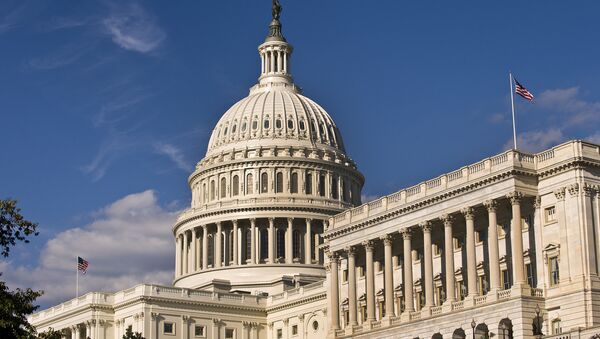PHILADELPHIA, November 5 (RIA Novisti) — In the run-up to last Tuesday’s voting, all of the respected statistical models (such as Nate Silver’s or those run by his successors at the New York Times) had the Republicans as heavy favorites to capture the Senate. What was rather surprising was the sheer scale of the victory. There were some advance indicators that the Republicans wouldn’t merely win but would win big (their polling advantage had been growing in the last few weeks leading up to the election) but even conservative activists were surprised at the extent of their triumph.
When the dust settled, the carnage on the Democratic side of the aisle was stunning. Republican candidates won at least 10 of the 13 most closely contested Senate races, including elections in the Midwest (Iowa) the Rockies (Colorado) and the South (North Carolina). As if for good measure, the GOP also increased its presence in the House of Representatives, adding 10 more seats to its already comfortable majority (the largest it has held since the 1940s).
The senate race in Virginia is a good précis of what the Democrats experienced last Tuesday. There a reasonably popular incumbent and former governor (Mark Warner) barely squeaked out victory against Ed Gillespie, an uninspiring Republican political operative and strategist who had never held elected office at any level. Elections in which one party has an across the board strong performance are sometimes called “wave” elections, but for Ed Gillespie to lose a state-wide election by less than 1%, “wave” is a totally inadequate description. It was a Republican tsunami, one that will take the Democratic party years to recover from.
A respectable performance by the Democrats would have allowed Barack Obama to maintain at least some of his political initiative. The Democrats’ implosion now means that the "lame duck" period of Obama's presidency, the time when a president has been replaced as the center of political gravity, has officially begun.
Obama will fulfill all of the ceremonial duties of his office, and he might even figure prominently in a few high-stakes standoffs with Congress. He could conceivably even veto a few pieces of legislation sent to his desk. But the time when Obama was "the decider," the time when the setting of the political agenda was up to him has now passed. Initiative will lie with Congress, and there will be an epic intra-party struggle for influence.
Two of the most prominent antagonists in this coming fight are Rand Paul (whom I have written about before) and Tom Cotton, the recently elected junior senator from Arkansas. Few foreigners will have heard of Tom Cotton, but they will get to know him in very short order. Cotton, like most politicians, is a complex and sometimes contradictory figure, but he can be thought of as essentially the anti-Paul. Whereas Rand Paul has staked his political future on the bet that Americans are tired of foreign wars, Cotton's stipulation is exactly the opposite: that Americans need to understand that the defense of their freedom at home necessitates the defense of the principles it espouses abroad.
From the standpoint of public opinion, the advantage unquestionably lies with Paul. Poll after poll has shown that Americans now regard the wars in both Iraq and Afghanistan as expensive failures, and that they have little appetite for intervention in Syria, Iraq (again), or any of the other current hotspots in the Middle East. Paul has persuasively argued that the GOP can only be successful by appealing to this “silent majority” who want America to occupy a more modest role in world politics.
Cotton’s advantage is that intra-party fights are not conducted in public, but behind closed doors. Ever since he burst forth into the public consciousness with a letter openly accusing the New York Times of treason for its reporting on military interrogation techniques, Cotton has assiduously cultivated ties with party donors and hawkish foreign policy analysts. Much more so than Paul, Cotton has quickly make himself part of the party establishment. In particular, Cotton struck up a friendship with William Kristol, the editor of the flagship neoconservative opinion magazine The Weekly Standard and one of Paul’s most prominent detractors.
Though I respect Paul’s political instincts, it’s simply too early to make any sort of prediction on who will emerge victorious from the looming Cotton-Paul confrontation. Cotton hasn’t even been inaugurated as a Senator yet, and it’s impossible to know ahead of time how he will react to the far more intense media scrutiny that he will face in Washington. Other politicians who seemed poised to become leading hawks (like former Minnesota senator Norm Coleman) have flamed out spectacularly after just a few years.
The fight between the GOP’s interventionist and isolationist wings, though, is absolutely crucial in determining the heart and soul of the party for years to come. So ignore the headlines about Obama fighting with Congress: this is mostly play-acting which is devoid of actual substance. In terms of America’s relationship with the outside world, the truly important fight is within the GOP itself.
The views expressed in this article are solely those of the author and do not reflect the official position of Sputnik.




